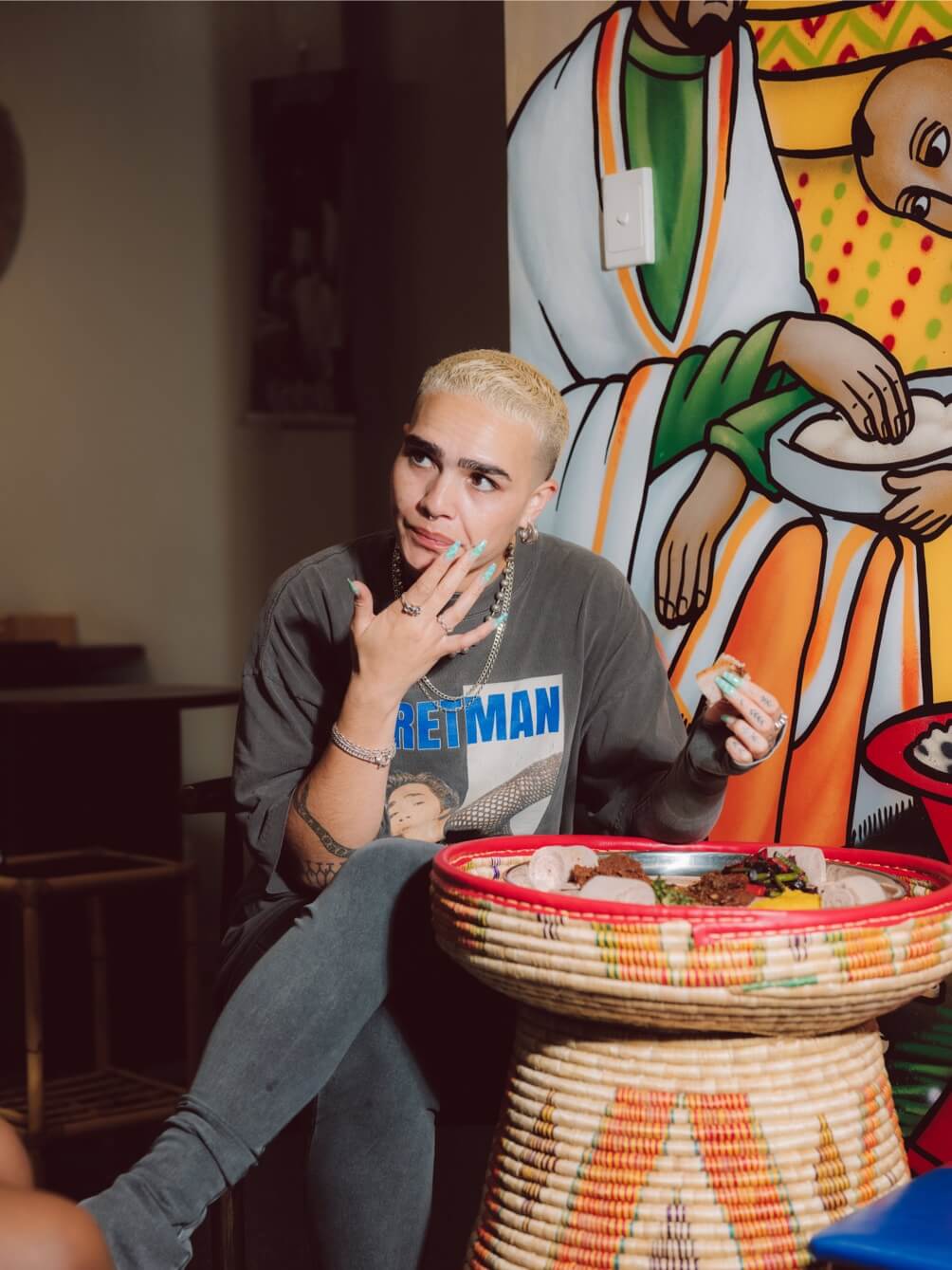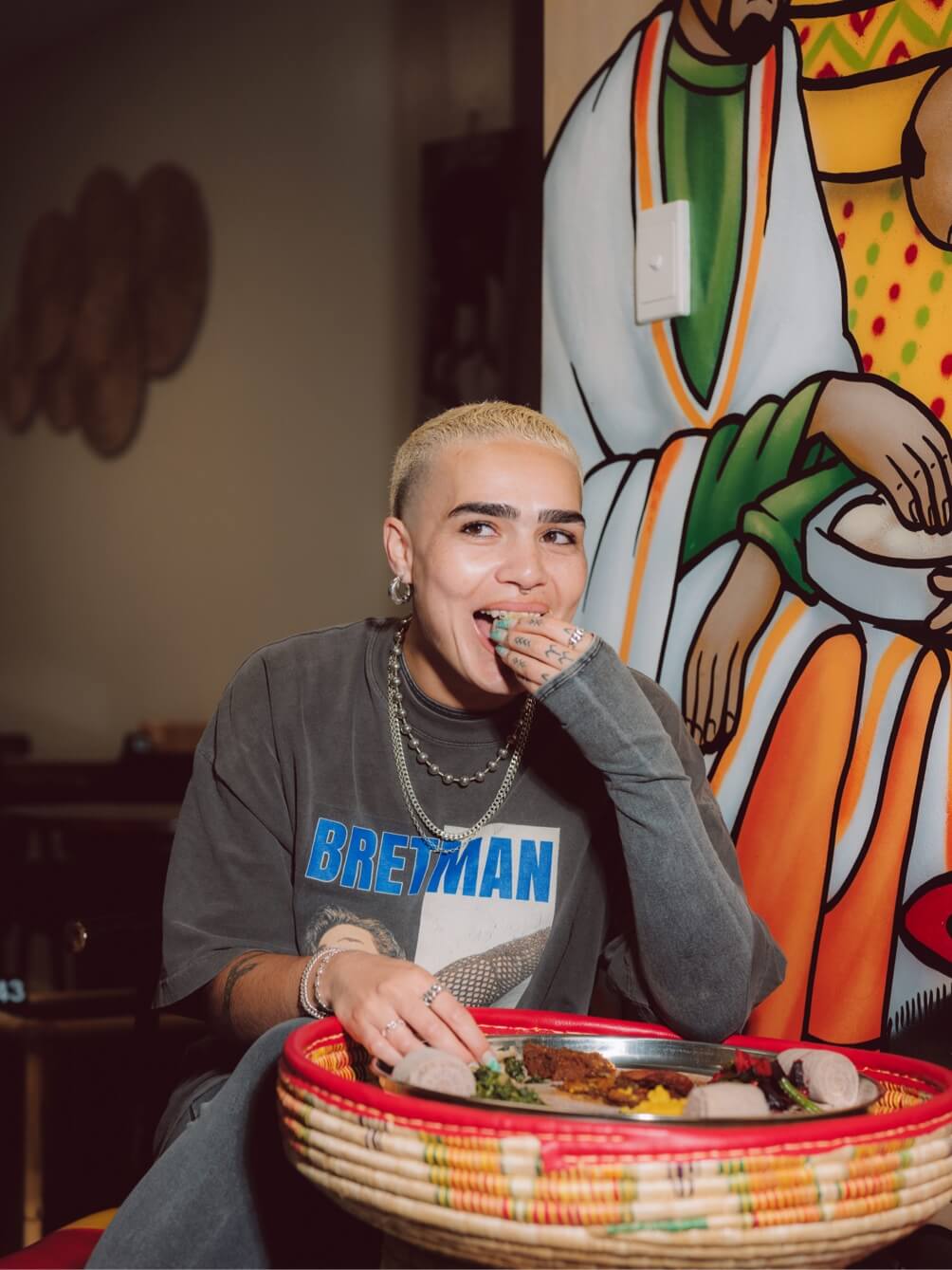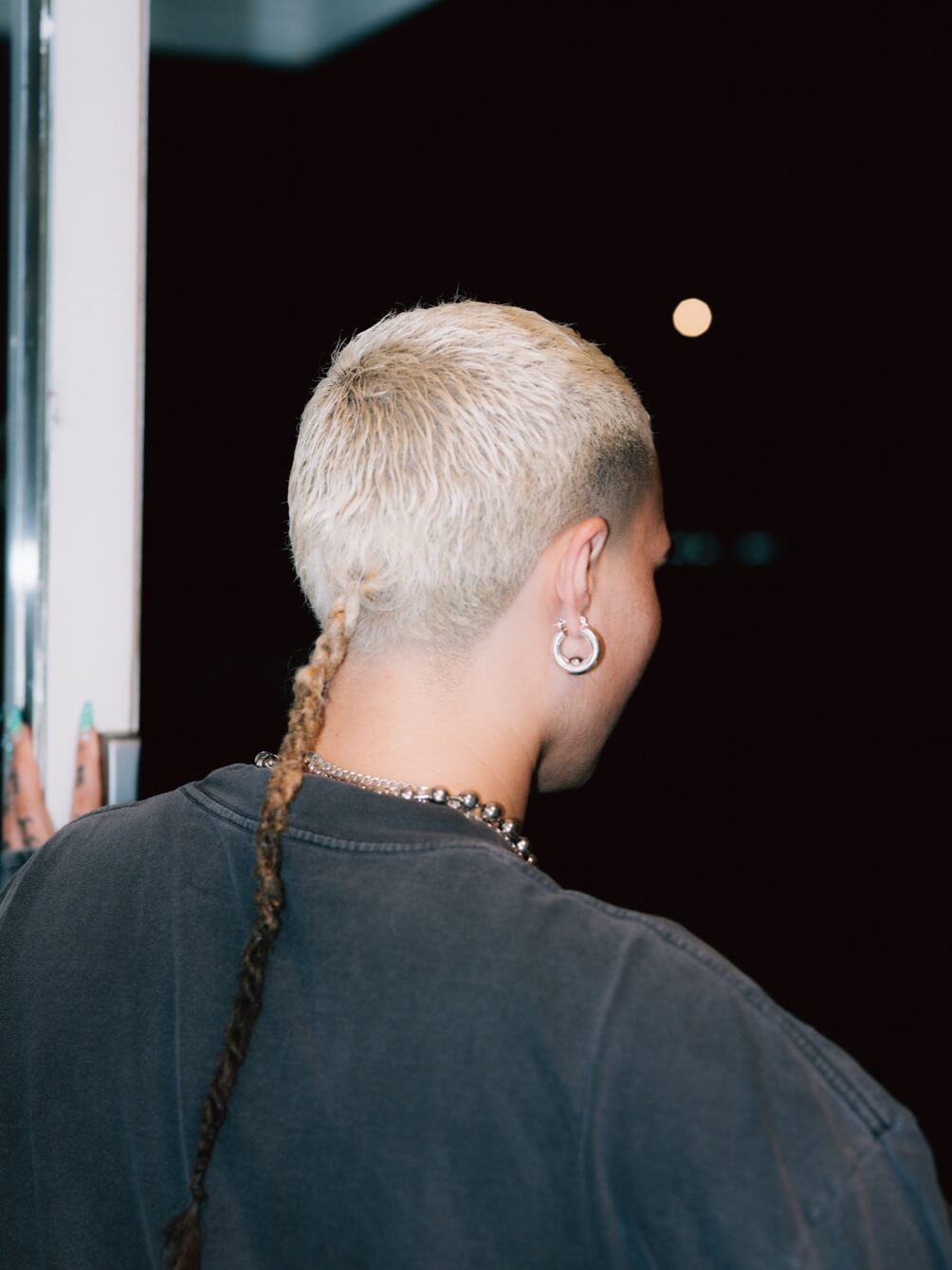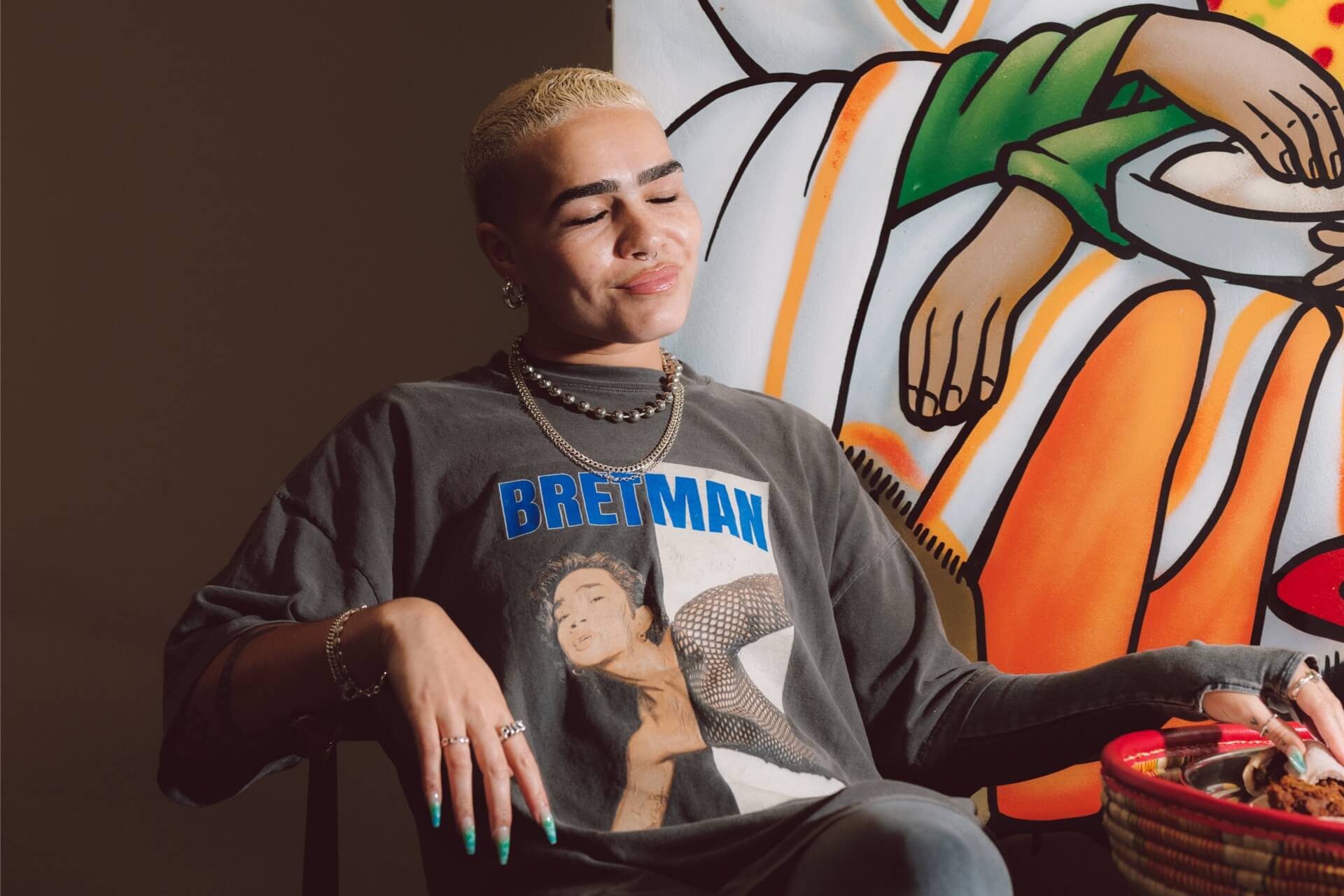Mar 6, 2023 Music
One evening in March 2021 at Neck of the Woods on Karangahape Rd, a group of around three hundred party-goers assembled in the venue’s dimly lit downstairs venue. A DJ named Half Queen was stationed at the decks, her face adorned in pink and blue makeup, arms covered in blue fingerless gloves to match an outfit which was, at that stage, still covered by a black ‘Free West Papua’ t-shirt.
Half Queen was one among several in the night’s line-up, curated as part of the Aotearoa debut of the global dance music and club culture platform Boiler Room. Initiated in 2010 as “a webcam taped to a wall, opening a keyhole into London’s underground”, Boiler Room has hosted over 8000 performances by more than 5000 artists, from Grammy Award-winners to avant-garde innovators. And for its first New Zealand appearance on that March evening, Boiler Room was hosting the MCs JessB and Rubi D and DJs Half Queen, Lady Shaka, Zeki and BBYFACEKILLA, all under the auspices of FILTH, one of the hottest and most talked about club nights in Auckland.
Co-founded by Half Queen and JessB, FILTH has become synonymous with genre-bending line-ups and jaw-dropping outfits. “The world didn’t make room,” one tagline reads, “so FILTH made another world.” It’s a bold statement, but one matched by reality. After becoming disappointed in a slew of male-dominated line-ups and predominantly white queer spaces, Half Queen and JessB (with the help of their friends) sought to carve out a new space in Auckland’s nightlife, creating a party for DJs and audiences to whom mainstream club culture and its patrons could be antagonistic, if not outright hostile. “There wasn’t anywhere that ticked all of our boxes,” Half Queen tells me. So they created something of their own from the ground up.
That something was a clash of queer popular aesthetics with the cultural identities of its closest communities: Black and Indigenous twenty-and thirty-somethings who were steeped in dancehall, hip-hop, R&B, soundsystem culture and vogue dance mixes, among other influences, as their everyday musical vernacular. FILTH’s magic was in putting a local spin to this mix of influences by drawing from cultures of Te Moana-nui-a-Kiwa, the Pacific. Notably, Lady Shaka’s set for that inaugural Auckland Boiler Room event opened with a mihi to the audience in te reo, before a brief poi performance to a mix of Oceania’s 1999 hit ‘Kotahitanga’. It was clear that FILTH had landed at something unique, something of this place and of this moment.
“In the beginning we really just didn’t know what we were getting ourselves into,” Half Queen tells me. The first edition of FILTH, held at Whammy Bar in 2018, sold out — the venue was full by 11pm, something which, as Half Queen reminds me, is pretty rare in New Zealand’s club culture. At that stage, she and JessB already had just enough of a profile to leverage promotion of their fledgling event. What began, more or less, as a party for a group of friends, peers and close networks has since grown into a certified brand — accruing enough credibility and cachet to bring to New Zealand the likes of chart-topping artist Azealia Banks.
The road to success for denizens of underground subcultures is often paved with compromise — Faustian bargains struck as a niche expands, once-jagged edges smoothed over as quid pro quo for cultural capital. But FILTH doesn’t appear to be doing too much of that, though it’s now up to its 11th event. (The most recent edition, FILTH VOL. 10, was held at The Hollywood in Avondale in October.) Half Queen does express a hint of sadness when she speaks of how much the party has changed from its pre-Boiler Room feel. “I just don’t know if we’ll ever get back to that,” she says, “but I have a lot of friends who throw similar parties, ones that have lasted 10 years and stuff.” Her tone shifts from one of lament to acceptance: “These changes are normal. They are just part of growing.”

Born Shaquille Wasasala on 6 April 1994 — when we chat she’s sporting a trucker cap with the word ‘Aries’ emblazoned on the front — to a Fijian father who emigrated to New Zealand at 21 to do missionary work and a Pākehā mother with South Island and Australian roots, Half Queen is the second of four children. When she tells me her parents met at church she makes a disgusted, retching noise — a reaction to Christianity’s colonial and queer-phobic impact, I presume. Her elder sibling, Jahra, is also a performer and artist, while her younger sibling Kitty is a writer and self-described “recovered ‘artist’”. Her only brother, Josaia, is a musician and an amateur wrestler. Half Queen is just one of a brood of creative souls.
For years, I knew her as Shaki — I first met her at a house party when she was 16, I was 19 — and it’s been fascinating to watch her career as Half Queen since then. When I video call her on a Tuesday afternoon in mid-November, Half Queen has recently moved into a new place in Herne Bay — “the scariest suburb I’ve ever lived in,” she says — with her friend, the MC, producer and film-maker, Paloma Schneideman aka PollyHill. Together Half Queen and PollyHill form the filmmaking duo Connie Ca$h, responsible for, among other collaborations, the music video for JessB’s 2018 hit ‘Set It Off ’. When I ask about her most formative musical experiences, Half Queen mentions that as an adolescent she had a television in her bedroom that constantly played Juice TV and C4. She was, like me, a member of MTV Generation 2.0, raised in the era of all-day music videos. Then she got an MP3 player, and began studiously downloading and uploading music. (She was even more committed when it came to burning CDs on to her Xbox gaming console.) When she eventually got an iPod, making playlists became her pastime du jour. But she never had the sense, at that early stage at least, that her obsession with music might amount to anything resembling a career.
“All my idols are musicians,” she tells me. Nowadays she gets to meet, and even play alongside, some of these idols — like Venus X, the DJ, style maven and founder of club night GHE20G0TH1K. Half Queen calls Venus X her “number-one inspiration”, strongly identifying with her “outspokenness and never compromising, groundbreaking, boundary-pushing energy”. But perhaps the idol who’s had the greatest impact on her is the queen of pop — or “Queen Mother”, as Half Queen refers to her. On our call, I’m conscious that she might be sick of discussing her onstage kiss with Madonna — so I’m a little coy when I broach it. I’m relieved to learn she’s not.
Back in 2016 when Madonna was on her Rebel Heart tour, Half Queen forked out for a ticket to her Auckland concert. She recalls that most of the other concert-goers in her section were sitting down, but she was up the entire time — “getting her money’s worth, giving choreography” — when a member of Madge’s team approached her to go on stage. Ever the fan, Half Queen knew all about the “Unapologetic Bitch” portion of the concert, when a member of the audience, usually a local celebrity, was brought up onto the stage and given a gift of some kind. Except this time the only thing the queen of pop had was a piece of fruit: a solitary banana. She peeled the banana and took a bite. Half Queen took one in turn. Then came the famous moment when Madonna put her mic down, leant towards her and said, “C’mon.” And there she was, on stage in front of thousands, locking lips with her idol. While many remember that story, few people know that Half Queen later went to Melbourne for another Madonna concert, after which she got to spend time with her idol. “She showered me with all kinds of wisdom, advice and validation,” she tells me.
The kiss alone was a formative moment for Half Queen, coinciding with an intense period of change in her personal life. She had recently turned 22 — to her mind at the time, an auspicious number and age — and she’d recently broken up with her high school boyfriend of several years. She was feeling ready to explore her sexual fluidity. In the moment of the now-famous kiss, Half Queen felt “chosen”. Soon after she amassed a throng of followers on Instagram under the handle @half.queen, prefiguring the moment when the chatter surrounding ‘the girl who kissed Madonna’ would give way to her own talents and a sound of her own making.

By the time Half Queen left high school, after a stint at Kaipara College in Helensville, she’d long known that it was all a bit of a farce — the pageantries of adolescence, the strictures of formal education, the petty social machinations of school life. She describes herself as a good student who enjoyed English and put her heart into essay writing — but she was ready to have the experience over with. She was ready for freedom; ready to claim her City Girl status. “As soon as I could leave Helensville, I did,” she tells me. Not sure what to do next, she caved to pressure to go to university where she studied film, though she never possessed a strong desire to become a filmmaker.
It was the city’s nightlife that really had her enthralled. While clubbing frequently and befriending DJs, a seed was sown. One of her friends, with whom she worked a retail job, was her first entree into the art of DJing. But “there weren’t any chicks”, she notes, reminding me that her line of work previously was and still can be a male-dominated boys’ club. During her apprentice years, Half Queen continued to work other jobs to pay the bills, never thinking that DJing could be the kind of job she could live off.
In 2017, after zeroing in on “a missing link” in her friend JessB’s performances, Half Queen proposed, on the rapper’s birthday, to fill the gap by becoming her DJ. The disc jockey has of course a storied place in hip-hop, playing a foundational role in the genre’s four key elements: turn- tabling, MCing, graffiti writing and breakdancing. From the early days of turntabling in the 1970s, the DJ has been there to “test the limits of sound and repurpose the old into something new”, as an article in XXL puts it. A good DJ will animate the MC’s performance, complementing their flow with additional tone and texture. JessB agreed to the proposal — if Half Queen mastered the craft, the job was hers. And so the next day Half Queen bought a controller and, with the laptop she’d purchased after months working as a postie, got to work. She spent six months in her bedroom, committed to practising up to six hours a day.
Half Queen received the odd lesson here and there from DJ friends, including one from London-based Lil C, whom Half Queen and JessB had met at Northern Bass, a music festival in Mangawhai, the previous year. Ethan James, a stalwart of Auckland’s rap and hip-hop scenes and a regular on the line-up for Shenanigan, a popular outdoor afternoon party started by David Dallas and friends, also gave Half Queen a quick tutorial. And IllBaz, now based in Dubai, even got Half Queen a guest residency at 1885 to piggyback off his own fixture there. “I have been, and I still am to this day, so incredibly blessed with such a loving network and support group of people,” she tells me. Her first official DJing gig was at the release party of JessB’s Bloom EP on Half Queen’s birthday — birthdays seem to have a special significance in Half Queen’s story — marking a wild new chapter.
Now that she’s made a name for herself, it is perhaps moments of growth and renewal that she’s seeking. When Half Queen is booked to headline a festival, the promoters and the audience expect a certain kind of set, usually turbo-charged and bass heavy. “I’m in a box,” she says, “both here and in Australia.” She seems grateful for her successes, but evidently misses the early days of playing around more, the kind of thing she did for bFM’s H2HO (rhymes with h2go) with co-selector Zeki, another FILTH regular and a staple in the city’s queer nightlife scenes. When I ask if she has any particular method to curating and performing a set, Half Queen says that now, after several years of DJing, it “just happens”. Much of a set’s ebb and flow depends on her mood and the crowd’s vibe — gone are the days of practising every transition. Things come together a lot more organically.

When I finally manage to catch Half Queen for a call, after several attempts, she’s in between trips and busy on an event for WorldPride in Sydney (to be co-produced with Dutty, FILTH’s unofficial ‘sister-party’ in Narrm Melbourne). She’s so busy and so often on the road, she half-jokingly suggests we do our photoshoot in the back of an Uber to the airport — “the only time I have,” she says. When she’s not travelling Aotearoa, playing gigs across the country, she’s often in Australia, where offers to perform are more forthcoming than at home. “I’m hardly ever booked in New Zealand. I’m hardly booked in Auckland.” In a small country where infrastructure is limited, it’s difficult for someone like Half Queen to find the opportunities to DJ regularly and keep growing as a performer. “I feel like I need to be here to see and implement the change that I know needs to happen,” she says. It’s a sense of duty that manifests in what she calls her “kaitiaki vibes” and it can sit uncomfortably against the niggling feeling that she’s neglecting her career by staying in this country, where there’s limited room to evolve. But stay she has, and New Zealand’s music and nightlife scenes are richer for it.
During our photoshoot at Gojo, a recently opened Ethiopian restaurant in New Lynn, Half Queen wore a lived-in-looking t-shirt with Bretman Rock, a Honolulu-based beauty influencer and social media personality, on the front. It’s the kind of item you might find on a vintage clothes site selling as a collectible, except the t-shirt was a recent release, purchased brand new. (Half Queen is, for the most part, not that interested in influencers, though some likely think of her as one.) She has always struck me as someone who isn’t in thrall to ‘trends’ or ‘celebrity’, but who finds her own idiosyncratic way of approaching popular culture. She has a gift for adding, to almost anything she touches, an air of desirability, giving new life to the familiar. In the same way, she remixes the contents of our everyday playlists into something transportive and otherworldly.
Half Queen’s personal style, too, is steeped in acts of transformation. The light-brown locs (commonly mislabelled ‘dreadlocks’) she sported in her 2021 Boiler Room set have since given way to a cropped blonde pixie cut with a long rat’s tail. A self-described lover of clothes and fashion, Half Queen says each evolution in her style marks entry into a different phase of her gender presentation. “I love waking up and feeling like wearing a wig one day or a skate pant the next.”
Among the many looks Half Queen has sported, that of the clown has cropped up time and again. Was she the class clown growing up? No, but she was the family clown. (Humour is one of the things she values most in life.) She hypothesises that clown imagery resonates for her because of time spent working as a stripper a few years back, before she was a DJ. She became acutely aware that her femininity was on sale, and it became even more integral to her identity — she was oversexualising herself, she says. When she started DJing, and FILTH kicked off, she started integrating ‘looks’ into the experience — the clown included — as a way to play with and complicate her image. Face paint is like a mask, a barrier to one’s appearance being too easily consumed. Figures like the artist-cum-club personality Leigh Bowery; the John Waters muse, Divine; and the “terrorist drag” artist Vaginal Davis — all of whom gave their feminine personae a somewhat frightening edge — come to mind.
“I would always dress as a clown if it were socially acceptable,” Half Queen says. “I think it makes sense: half-queen, half-monster.” Half Queen certainly enjoys playing with duality. She also mentions the paradox of the sad clown (“the funniest people are often the most depressed”), and I like to think of her as a court jester. She offers comic relief and challenges the brokers of power under the guise of entertainment — through her image, her music and her words. And now, with her star risen high, perhaps she is all these things at once — half-jester, half-monster, all queen.
–






